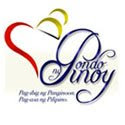Hunger of Body and Spirit
Of the many scourges that mankind faces, one might say that hunger is the most insidious of foes. Slowly, yet with sinister certainty, hunger and malnutrition eat away not just a person's health, but also his sense of self-respect, his dignity, and finally, his faith in the mercy of God.
Pondo ng Pinoy, however, has always believed in the virtue of "small things", and that even the smallest advancement can make a considerable difference in a person's life - and thus, even the simplest of meals can still provide sustenance to a hungry child. While it is true that many families must cope with very meager resources, it is the belief of Pondo ng Pinoy that - as in the story of the loaves and fish - modest resources coupled with a community spirit and faith in the compassion of a Merciful God, can indeed work miracles.
And so it was that in nine parishes located in some of Metro Manila's most populous areas - Novaliches, Manila, Caloocan - Pondo ng Pinoy began its humble efforts to give a handful of hungry children a hot, nutritious meal, and transform the family hapagkainan into "Hapag-Asa".
Let the little ones come to Me …
A day at the Hapag-Asa parish feeding center starts out in much the same way as an ordinary day would start in homes across the country - with some exceptions. Here, the family is slightly larger, and includes volunteers from the parish as well as the mothers of some of the children who are the youngbeneficiaries of the Hapag-Asa program. Amid this domestic flurry, however, the Hapag-Asa volunteers work to teach their young guests a number of ordinary habits that have extraordinary effects. The food at the Hapag-Asa table is simple, yet nutritious; it would not be unusual to see a bowl of steaming misua soup, made even tastier and truly healthful by the addition of vegetables - an excellent alternative to instant noodles. Yet what makes a meal at the Hapag-Asa table truly a feast for the spirit are the gentle lessons learned by the children who come to share these simple yet nourishing meals. To say "magandang umaga po." To wash up before eating. To sit properly at the dining table. To say a prayer of thanks before a single morsel is eaten. Courtesy. Cleanliness. Self-respect. And yes, gratitude.
Food for the body. Food for the soul.
A few weeks into the program, the volunteers of Hapag-Asa were rewarded by some of the most heartwarming developments. Along with the improved physical health, the children's mental faculties also became noticeably enhanced. One mother from the a Kalookan City parish was pleasantly surprised when her child - who could only do chores after a litany of instructions - could now go about her tasks with but a few basic directions.
In many ways, the food offered at the Hapag-Asa table is nourishment not only for the body, but certainly for the soul.
Nowhere was this more evident than in several positive changes in the lives of some parents. A mother from one of the participating Manila was so inspired by the program's values formation sessions that she decided to go back to school, to continue her formal education. Other volunteers began to realize the truth behind the time-honored saying "It is better to give than to receive.” Perhaps the most touching change brought about by the Hapag-Asa program was related by one father; a longtime alcoholic, he found - through the program's catechism sessions - the strength to break his destructive habit.
On the whole, the parents participating in the program found a new appreciation not only of their family life, but of their own roles as parents. Many discovered themselves becoming more sensitive to their children's needs, while others realized that although making a living is an essential aspect of family life, so too is setting aside time and energy to attend to their children's spiritual growth. In virtually all the parishes, a spirit of solidarity and friendship evolved among the parents - buoyed by the camaraderie they found in each other, many found a new hope in their future, and in themselves.
Not surprisingly, the Hapag-Asa program also brought much-needed spiritual nourishment to the parish priests of the participating parishes. Encouraged by the involvement of both volunteers and parents, and inspired by the joy of the children, many of the priests found a more profound fulfillment in their pastoral ministry. A priest from Kalookan City promoted Hapag-Asa to his friends residing abroad; one was so moved by the priest's stories of the children who came to the feeding program that he sent two balikbayan boxes filled with toys and clothes for the program's young charges.
Hope, indeed, was on the Hapag-Asa menu.
By Lisa Bueno as inspired by the Hapag-Asa reports
The Hapag-Asa Program aims to alleviate extreme hunger among poor Filipino children. Its four major components: supplemental feeding, health education, spiritual formation and livelihood. A total of 120,000 children nationwide is sought to be salvaged from malnutrition and health-related illnesses between 2005 and 2007. This is a drop-in-the-bucket considering that there are millions of children experiencing hunger. Right now 65,000 undernourished children are enrolled nationwide in 37 dioceses, LGUs, NGOs and schools.
The cost of feeding is P10.00/child per day, five days a week for six months or just P1,200 to feed one child, P12,000 to feed 10 children and P120,000 to support a parish program for 100 children. For donations you may deposit to the following Pondo ng Pinoy Hapag-asa (Current) Bank accounts:
Bank of the Philippine Islands (CA) 3061-0858-22
Banco de Oro (CA) 228020364
China Banking Corp. (CA) 103-57972-19
Equitable PCI (CA) 0115-04248-3
Metro Bank (CA) 175-7175-50963-8
Of the many scourges that mankind faces, one might say that hunger is the most insidious of foes. Slowly, yet with sinister certainty, hunger and malnutrition eat away not just a person's health, but also his sense of self-respect, his dignity, and finally, his faith in the mercy of God.
Pondo ng Pinoy, however, has always believed in the virtue of "small things", and that even the smallest advancement can make a considerable difference in a person's life - and thus, even the simplest of meals can still provide sustenance to a hungry child. While it is true that many families must cope with very meager resources, it is the belief of Pondo ng Pinoy that - as in the story of the loaves and fish - modest resources coupled with a community spirit and faith in the compassion of a Merciful God, can indeed work miracles.
And so it was that in nine parishes located in some of Metro Manila's most populous areas - Novaliches, Manila, Caloocan - Pondo ng Pinoy began its humble efforts to give a handful of hungry children a hot, nutritious meal, and transform the family hapagkainan into "Hapag-Asa".
Let the little ones come to Me …
A day at the Hapag-Asa parish feeding center starts out in much the same way as an ordinary day would start in homes across the country - with some exceptions. Here, the family is slightly larger, and includes volunteers from the parish as well as the mothers of some of the children who are the youngbeneficiaries of the Hapag-Asa program. Amid this domestic flurry, however, the Hapag-Asa volunteers work to teach their young guests a number of ordinary habits that have extraordinary effects. The food at the Hapag-Asa table is simple, yet nutritious; it would not be unusual to see a bowl of steaming misua soup, made even tastier and truly healthful by the addition of vegetables - an excellent alternative to instant noodles. Yet what makes a meal at the Hapag-Asa table truly a feast for the spirit are the gentle lessons learned by the children who come to share these simple yet nourishing meals. To say "magandang umaga po." To wash up before eating. To sit properly at the dining table. To say a prayer of thanks before a single morsel is eaten. Courtesy. Cleanliness. Self-respect. And yes, gratitude.
Food for the body. Food for the soul.
A few weeks into the program, the volunteers of Hapag-Asa were rewarded by some of the most heartwarming developments. Along with the improved physical health, the children's mental faculties also became noticeably enhanced. One mother from the a Kalookan City parish was pleasantly surprised when her child - who could only do chores after a litany of instructions - could now go about her tasks with but a few basic directions.
In many ways, the food offered at the Hapag-Asa table is nourishment not only for the body, but certainly for the soul.
Nowhere was this more evident than in several positive changes in the lives of some parents. A mother from one of the participating Manila was so inspired by the program's values formation sessions that she decided to go back to school, to continue her formal education. Other volunteers began to realize the truth behind the time-honored saying "It is better to give than to receive.” Perhaps the most touching change brought about by the Hapag-Asa program was related by one father; a longtime alcoholic, he found - through the program's catechism sessions - the strength to break his destructive habit.
On the whole, the parents participating in the program found a new appreciation not only of their family life, but of their own roles as parents. Many discovered themselves becoming more sensitive to their children's needs, while others realized that although making a living is an essential aspect of family life, so too is setting aside time and energy to attend to their children's spiritual growth. In virtually all the parishes, a spirit of solidarity and friendship evolved among the parents - buoyed by the camaraderie they found in each other, many found a new hope in their future, and in themselves.
Not surprisingly, the Hapag-Asa program also brought much-needed spiritual nourishment to the parish priests of the participating parishes. Encouraged by the involvement of both volunteers and parents, and inspired by the joy of the children, many of the priests found a more profound fulfillment in their pastoral ministry. A priest from Kalookan City promoted Hapag-Asa to his friends residing abroad; one was so moved by the priest's stories of the children who came to the feeding program that he sent two balikbayan boxes filled with toys and clothes for the program's young charges.
Hope, indeed, was on the Hapag-Asa menu.
By Lisa Bueno as inspired by the Hapag-Asa reports
The Hapag-Asa Program aims to alleviate extreme hunger among poor Filipino children. Its four major components: supplemental feeding, health education, spiritual formation and livelihood. A total of 120,000 children nationwide is sought to be salvaged from malnutrition and health-related illnesses between 2005 and 2007. This is a drop-in-the-bucket considering that there are millions of children experiencing hunger. Right now 65,000 undernourished children are enrolled nationwide in 37 dioceses, LGUs, NGOs and schools.
The cost of feeding is P10.00/child per day, five days a week for six months or just P1,200 to feed one child, P12,000 to feed 10 children and P120,000 to support a parish program for 100 children. For donations you may deposit to the following Pondo ng Pinoy Hapag-asa (Current) Bank accounts:
Bank of the Philippine Islands (CA) 3061-0858-22
Banco de Oro (CA) 228020364
China Banking Corp. (CA) 103-57972-19
Equitable PCI (CA) 0115-04248-3
Metro Bank (CA) 175-7175-50963-8




No comments:
Post a Comment